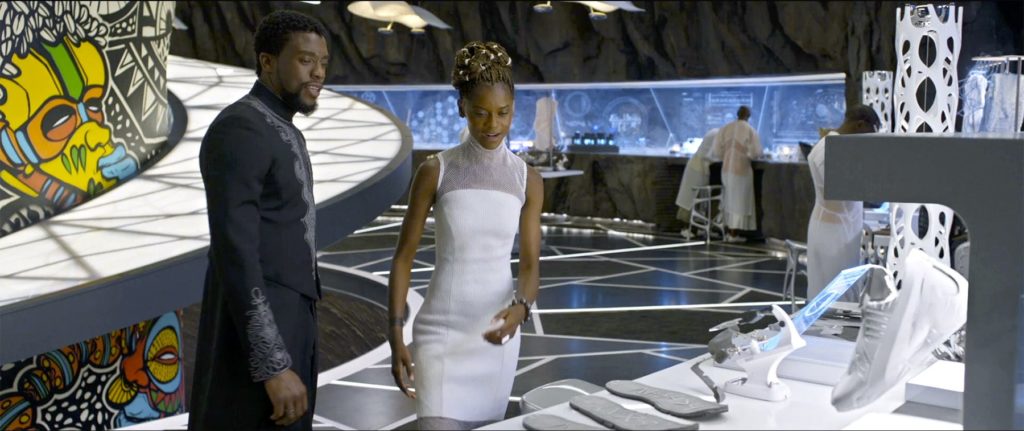[vc_row padding_top=”0px” padding_bottom=”0px”][vc_column fade_animation_offset=”45px” width=”1/1″][text_output]By Koshi Dhingra, Ed.D
As the world prepares for the upcoming Oscars, Hollywood has a chance to change its ways. Many TV shows and movies depict women and girls as the unattractive, overworked nerd or the lonely, strange, and unhappy person who may be brilliant in her field but who would want to be in her shoes? Those images define STEM in narrow ways and depict STEM practitioners in equally limiting ways. These narrow definitions are damaging because it has caused many girls to avoid pursuing math and science coursework at school, and a host of careers that could otherwise have been open to them. Sure, there are some minor victories, such as Letitia Wright’s role as Shuri in the blockbuster film, Black Panther. Or perhaps the Mckenna Grace, 7-year-old prodigal math genius, who plays Mary Adler in the hit TV show, Gifted. Or the movie, Hidden Figures, based on the New York Times best-selling book by Margot Lee Shetterly that dramatized the work of the pioneering human computers and female mathematicians working for NASA in the 1960s.
But there’s much work to be done.
A recent study by the Geena Davis Institute on Gender in Media, Portray Her: Representations of Women STEM Characters in Media, firmly declares that it is a time to change the portrayal of women and girls in science that are rare or stereotypical. “From our research study, we know that men STEM characters outnumber women STEM characters nearly 2 to 1,” says Nicole Small, president and CEO of the Lyda Hill Foundation, which partnered with the institute on the study. “Stories of women in STEM are not being told enough in the media, and therefore, young girls are not seeing themselves in these fields. We know that if you show a little girl what women in STEM are accomplishing today, then that little girl will believe that she too can be a force for positive change.”
That force for positive change means shifting the focus from solely making sure women and girls have to have certain math or science skills to make sure they have a “STEM mindset.” The new world order of the workplace is that proficiency in math and science, together with a STEM mindset of inquiry, exploration, iteration, and reiteration are required for someone to succeed in the workplace. Merle Froshl, director of educational equity of FHI360, an international nonprofit that in part is doing research to improve girls’ math identity, says it so profoundly. “We need to change the way math is taught. We need inquiry-based mathematics and not functional based mathematics, and we need to start early,” Froshl says. Even if girls and women do not intend to become nuclear physicists or biomedical engineers, we live in a world where data analytics, critical thinking, computational thinking, and a basic adeptness in learning new technologies is almost embedded in any job we do. According to Cengage Learning, eight of the top 10 jobs today require mathematics, technology, or science. Far too often there’s discussion of a “STEM pipeline” tied to specific skills when what we’re talking about is creating a STEM Network that is a far more inclusive, interdisciplinary approach that embraces and challenges women and girls to find their identifies that will allow them to excel in a STEM-related field they choose. It’s a network that connects the world’s female STEM practitioners in diverse spheres of activity in a way that allows them to share their intellect, expertise, wisdom, inspiration and knowledge. It’s a network that can cultivate a generation of female STEM explorers of all ages who demonstrate a STEM mindset, but also serve as role models for girls and young women.
It all boils down to redefining the image of women and girls in Hollywood and creating a global STEM network that can transform the way in which a generation of girls and women access once elusive opportunities to learn, grow and build careers.
 About Koshi Dhingra, Ed.D
About Koshi Dhingra, Ed.D
Koshi Dhingra is founder of talkSTEM, a nonprofit organization that energizes communities around participating in rich STEM and STEAM learning experiences, with the goal of broadening participation in these areas. She has a doctorate in science education from Teachers College, Columbia University, and has years of experience teaching at the middle and high school levels, as well as teaching in teacher education programs. She has served as a director of the Science and Engineering Education Center at the University of Texas at Dallas.[/text_output][/vc_column][/vc_row]
